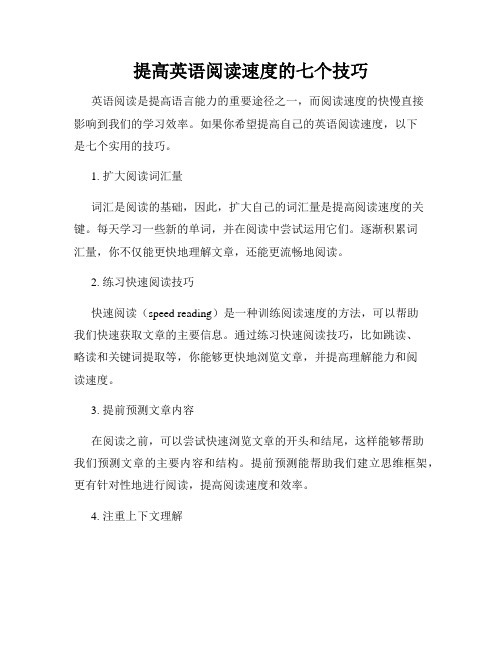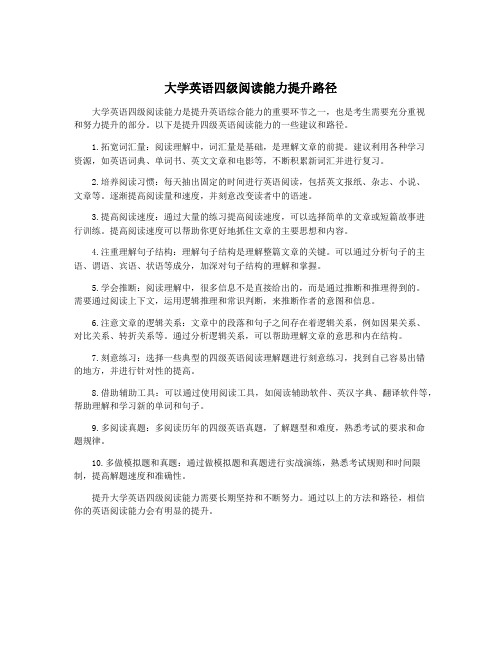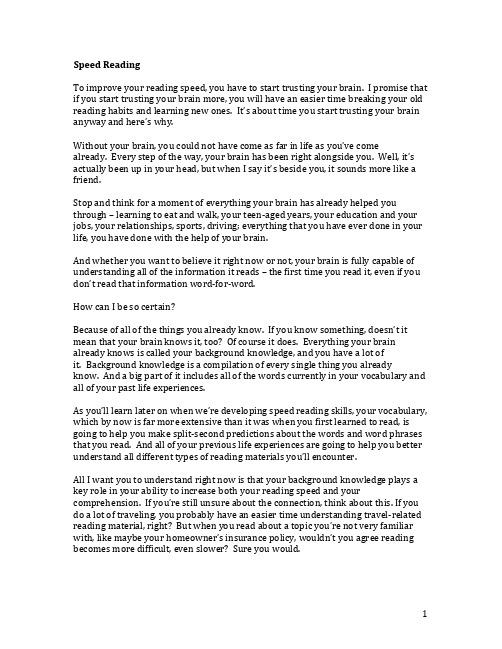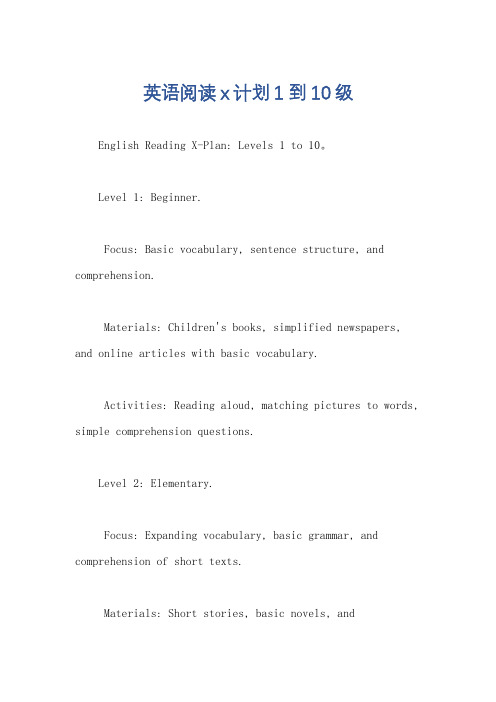英语阅读能力提升Chapter 1 Speed Reading-4
英语阅读练习册一本

英语阅读练习册一本Introduction:The journey to becoming proficient in English reading is both exciting and challenging. This workbook is designed to guide you through various levels of reading comprehension, vocabulary expansion, and critical thinking exercises that will enhance your English reading skills.Chapter 1: Building a Strong Vocabulary- Section 1.1: Understanding Word Roots, Prefixes, and Suffixes- Section 1.2: Context Clues for Word Meaning- Section 1.3: Synonyms and Antonyms- Section 1.4: Vocabulary Drills and QuizzesChapter 2: Reading Comprehension Strategies- Section 2.1: Skimming and Scanning Texts- Section 2.2: Identifying Main Ideas and Supporting Details - Section 2.3: Making Inferences and Drawing Conclusions- Section 2.4: Comprehension Exercises with Answer KeysChapter 3: Exploring Different Genres- Section 3.1: Narrative and Descriptive Texts- Section 3.2: Expository and Persuasive Writing- Section 3.3: Poetry and Drama- Section 3.4: Genre-Specific Reading ComprehensionActivitiesChapter 4: Critical Reading and Analysis- Section 4.1: Recognizing Author's Purpose and Tone- Section 4.2: Analyzing Argumentative Texts- Section 4.3: Evaluating Evidence and Logic- Section 4.4: Critical Reading Practice with Discussion PromptsChapter 5: Improving Reading Speed and Efficiency- Section 5.1: Techniques for Speed Reading- Section 5.2: Avoiding Subvocalization- Section 5.3: Reading for Pleasure vs. Reading for Information- Section 5.4: Speed Reading Drills and Timed TestsChapter 6: Cultural and Contextual Understanding- Section 6.1: Reading Texts from Diverse Cultural Backgrounds- Section 6.2: Understanding Idioms and Slang- Section 6.3: Recognizing Cultural References and Allusions - Section 6.4: Cross-Cultural Reading Comprehension ExercisesChapter 7: Test-Taking Strategies for English Reading- Section 7.1: Preparing for Standardized English Tests- Section 7.2: Strategies for Answering Multiple Choice Questions- Section 7.3: Writing Effective Reading Comprehension Answers- Section 7.4: Sample Test Questions with Detailed ExplanationsConclusion:This workbook is a comprehensive tool for anyone looking to improve their English reading abilities. By working through the exercises and activities, readers will not only enhance their understanding of the language but also develop a lifelong love for reading in English.Glossary of Terms- A list of key vocabulary words introduced throughout the workbook, along with their definitions and examples of usage.Answer Key- Detailed solutions to all exercises and quizzes, providing learners with feedback and reinforcement of concepts learned.Appendix- Additional resources, including recommended reading lists, online tools for further practice, and tips for maintaining reading habits.。
阅读能力的提高英语作文

阅读能力的提高英语作文
前言
阅读能力是英语学习中非常重要的一部分,通过阅读不仅可以提高词汇量,还可以了解语法结构和提高写作能力。
因此,提高阅读能力是学习英语不可忽视的一环。
如何提高阅读能力
1. 多读英语原版书籍
阅读英语原版书籍是提高阅读能力最有效的方法之一。
选择适合自己水平的书籍,可以从简单的故事书开始,逐渐提升到文学作品和专业书籍,不断挑战自己的阅读能力。
2. 多做阅读理解题
做阅读理解题是提高阅读能力的有效方法之一。
通过做题目,能够提高阅读速度和理解能力,同时检验自己对文章的理解程度。
3. 利用工具辅助阅读
现在有很多工具可以辅助英文阅读,比如使用字典软件查阅生词,使用阅读器调整阅读速度和背景颜色,提高阅读效率和舒适度。
总结
提高阅读能力需要长期坚持和不断练习,希望以上方法能够帮助大家提高阅读水平,更好地学习英语。
以上是关于如何提高阅读能力的英语作文,希望对大家有所帮助。
欢迎大家在评论区留言分享自己的学习经验和建议。
提升阅读能力方法英语作文

提升阅读能力方法英语作文Improving Reading Skills。
Reading is an essential skill that everyone needs to develop in order to succeed in life. Whether it's for academic, professional, or personal reasons, being able to read and comprehend written material is crucial. However, many people struggle with reading, either because they find it boring, difficult, or simply don't know how to improve their skills. Fortunately, there are several effective methods that can help individuals enhance their reading abilities.First and foremost, it's important to choose reading material that is interesting and engaging. Whether it's fiction, non-fiction, newspapers, magazines, or online articles, finding content that captivates the reader's attention is key. When people are genuinely interested in what they're reading, they are more likely to stay focused and absorb the information. Additionally, reading materialthat is slightly above one's current reading level can also help to challenge and improve their skills.Another effective method for improving reading skillsis to practice reading regularly. Just like any other skill, the more one practices, the better they become. Setting aside time each day to read, even if it's just for a few minutes, can make a significant difference in one's reading abilities. This can be done by establishing a reading routine, such as reading before bed, during lunch breaks,or on public transportation. The key is to make reading a habit.Furthermore, it's important to actively engage with the material while reading. This can be done by asking questions, making predictions, and summarizing the content. Actively interacting with the text not only improves comprehension but also helps to retain the information. Additionally, discussing the material with others, whetherit's a friend, family member, or book club, can provide different perspectives and deepen one's understanding ofthe material.In addition to these methods, there are also various reading strategies that can help individuals become more efficient readers. For example, skimming and scanning can be useful for quickly locating specific information within a text. Additionally, annotating and highlighting can help to identify key points and make it easier to review the material later on. These strategies can be particularly helpful when reading academic or professional material.Finally, seeking out additional support and resources can also be beneficial for improving reading skills. This can include working with a tutor, taking a reading course, or using online tools and apps designed to enhance reading comprehension. Additionally, joining a book club or participating in reading challenges can provide motivation and accountability for individuals looking to improve their reading habits.In conclusion, developing strong reading skills is essential for success in life. By choosing engaging reading material, practicing regularly, actively engaging with thematerial, utilizing reading strategies, and seeking additional support, individuals can significantly enhance their reading abilities. With dedication and effort, anyone can become a proficient and confident reader.。
提高英语阅读速度的七个技巧

提高英语阅读速度的七个技巧英语阅读是提高语言能力的重要途径之一,而阅读速度的快慢直接影响到我们的学习效率。
如果你希望提高自己的英语阅读速度,以下是七个实用的技巧。
1. 扩大阅读词汇量词汇是阅读的基础,因此,扩大自己的词汇量是提高阅读速度的关键。
每天学习一些新的单词,并在阅读中尝试运用它们。
逐渐积累词汇量,你不仅能更快地理解文章,还能更流畅地阅读。
2. 练习快速阅读技巧快速阅读(speed reading)是一种训练阅读速度的方法,可以帮助我们快速获取文章的主要信息。
通过练习快速阅读技巧,比如跳读、略读和关键词提取等,你能够更快地浏览文章,并提高理解能力和阅读速度。
3. 提前预测文章内容在阅读之前,可以尝试快速浏览文章的开头和结尾,这样能够帮助我们预测文章的主要内容和结构。
提前预测能帮助我们建立思维框架,更有针对性地进行阅读,提高阅读速度和效率。
4. 注重上下文理解有时候,我们可能会遇到一些生词或者不熟悉的词组,但并不需要完全停下来查字典。
尝试通过上下文推测词义,这不仅能帮助我们继续阅读,还能锻炼我们的上下文理解能力。
5. 运用分析技巧阅读时应注重分析文章的结构和逻辑关系。
有时文章会使用转折词、因果关系词或者比较对比词等,通过识别这些关键词,能更好地理解文章,提高阅读速度和准确性。
6. 制定阅读计划制定一个合理的阅读计划,可以帮助我们更有目标地进行阅读,并提高阅读速度。
根据自己的实际情况,合理安排每天的阅读时间和阅读量,将阅读作为一种日常习惯,坚持下去。
7. 多样化阅读材料不要局限于某一种类型的阅读材料,尝试阅读各种各样的文章,包括新闻、科技、文学等。
多样化的阅读材料能够帮助我们接触到不同领域的词汇和用法,提高我们的阅读速度和理解能力。
通过运用以上七个技巧,相信你会在不经意间提高自己的英语阅读速度。
记住,阅读是一项长期的积累和训练过程,持之以恒,你一定能够取得良好的阅读效果。
加油!。
大学英语四级阅读能力提升路径

大学英语四级阅读能力提升路径大学英语四级阅读能力是提升英语综合能力的重要环节之一,也是考生需要充分重视和努力提升的部分。
以下是提升四级英语阅读能力的一些建议和路径。
1.拓宽词汇量:阅读理解中,词汇量是基础,是理解文章的前提。
建议利用各种学习资源,如英语词典、单词书、英文文章和电影等,不断积累新词汇并进行复习。
2.培养阅读习惯:每天抽出固定的时间进行英语阅读,包括英文报纸、杂志、小说、文章等。
逐渐提高阅读量和速度,并刻意改变读者中的语速。
3.提高阅读速度:通过大量的练习提高阅读速度,可以选择简单的文章或短篇故事进行训练。
提高阅读速度可以帮助你更好地抓住文章的主要思想和内容。
4.注重理解句子结构:理解句子结构是理解整篇文章的关键。
可以通过分析句子的主语、谓语、宾语、状语等成分,加深对句子结构的理解和掌握。
5.学会推断:阅读理解中,很多信息不是直接给出的,而是通过推断和推理得到的。
需要通过阅读上下文,运用逻辑推理和常识判断,来推断作者的意图和信息。
6.注意文章的逻辑关系:文章中的段落和句子之间存在着逻辑关系,例如因果关系、对比关系、转折关系等。
通过分析逻辑关系,可以帮助理解文章的意思和内在结构。
7.刻意练习:选择一些典型的四级英语阅读理解题进行刻意练习,找到自己容易出错的地方,并进行针对性的提高。
8.借助辅助工具:可以通过使用阅读工具,如阅读辅助软件、英汉字典、翻译软件等,帮助理解和学习新的单词和句子。
9.多阅读真题:多阅读历年的四级英语真题,了解题型和难度,熟悉考试的要求和命题规律。
10.多做模拟题和真题:通过做模拟题和真题进行实战演练,熟悉考试规则和时间限制,提高解题速度和准确性。
提升大学英语四级阅读能力需要长期坚持和不断努力。
通过以上的方法和路径,相信你的英语阅读能力会有明显的提升。
Speed Reading快速阅读

Speed ReadingTo improve your reading speed, you have to start trusting your brain. I promise that if you start trusting your brain more, you will have an easier time breaking your old reading habits and learning new ones. It’s about time you start trus ting your brain anyway and here’s why.Without your brain, you could not have come as far in life as you’ve come already. Every step of the way, your brain has been right alongside you. Well, it’s actually been up in your head, but when I say it’s besid e you, it sounds more like a friend.Stop and think for a moment of everything your brain has already helped you through – learning to eat and walk, your teen-aged years, your education and your jobs, your relationships, sports, driving; everything that you have ever done in your life, you have done with the help of your brain.And whether you want to believe it right now or not, your brain is fully capable of understanding all of the information it reads – the first time you read it, even if you don’t re ad that information word-for-word.How can I be so certain?Because of all of the things you already know. If you know something, doesn’t it mean that your brain knows it, too? Of course it does. Everything your brain already knows is called your background knowledge, and you have a lot ofit. Background knowledge is a compilation of every single thing you already know. And a big part of it includes all of the words currently in your vocabulary and all of your past life experiences.As you’ll learn later on when we’re developing speed reading skills, your vocabulary, which by now is far more extensive than it was when you first learned to read, is going to help you make split-second predictions about the words and word phrases that you read. And all of your previous life experiences are going to help you better understand all different types of reading materials you’ll encounter.All I want you to understand right now is that your background knowledge plays a key role in your ability to increase both your reading speed and your comprehension. If you’re still unsure about the connection, think about this. If you do a lot of traveling, you probably have an easier time understanding travel-related reading material, right? But when you read about a top ic you’re not very familiar with, like maybe your homeowner’s insurance policy, wouldn’t you agree reading becomes more difficult, even slower? Sure you would.But what you may not realize is that whenever you read unfamiliar material, there is almost always something in your background knowledge that you can draw upon to help you become more familiar with an unfamiliar topic.For example, if you’ve lived in a home before, you can call upon that experience that’s maintained inside your brain to help you understand all of the different things inside and outside your home that are and are not covered in your insurance policy. When you learn how to use your brain in this way, you will have learned a very effective way of broadening your knowledge base.Now let me finish off by pointing out something else I’ve learned from all of the years I’ve taught speed reading:The people with the most background knowledge are typically the people who have the most success with improving their reading speed.If you recall, I began this post discussing the importance of knowledge. Back then I told you that knowledge is power and that knowledge attracts others and helps you reach your goals.I also said that having knowledge means being able to comprehend what you read, retain it, and recall it when you need it. I told you then that learning to speed read will help you gain more knowledge because you’ll be able to read more with better comprehension. And as a result, reading will become more enjoyable. Now I’m telling you that having more knowledge will facilitate increased reading speed. So what does all this mean? It means that the more you read, the more you know, and the more you know, the faster you read. And the faster you read, the faster you gain more knowledge. And the more knowledge you gain the more power youhave. Beautiful, isn’t it?Here’s one final thought.Every single day you have an opportunity to broaden your knowledge simply by living and being inquisitive, but mostly by reading. Whether you read at the library or online, or you pick up a book that’s been sitting on your bookshelf for as long as you remember doesn’t matter.All you have to do is find something you’re not familiar with, read it, and when you’re finished, you will know more than you did before you started reading.And that is how you build more knowledge.By learning how to increase your reading speed and learning to read with better comprehension, you will be able to read more than you ever could before. As a result, you will also build knowledge faster than you ever could before and faster than people who don’t speed read!And that’s going to give you the competitive edge you need to succeed in today’s increasingly competitive world.Now that’s some powerful stuff, isn’t it!。
提高阅读的速度英语作文

提高阅读的速度英语作文Title: Enhancing Reading Speed: Strategies and Benefits。
In today's fast-paced world, the ability to readquickly and efficiently is a valuable skill. Whether it'sfor academic purposes, professional advancement, or simply personal enrichment, improving reading speed can have numerous benefits. In this essay, we will explorestrategies to enhance reading speed and the advantages it brings.Firstly, it's essential to understand that readingspeed is not just about reading fast; it's also about comprehension. Reading quickly but failing to grasp the content defeats the purpose. Therefore, strategies to improve reading speed should also focus on comprehension. 。
One effective technique is skimming. Skimming involves quickly glancing through the text to get a general idea of its content. This can be done by reading headings,subheadings, and the first and last sentences of paragraphs. Skimming allows readers to grasp the main points without getting bogged down in details. 。
英语阅读x计划1到10级

英语阅读x计划1到10级English Reading X-Plan: Levels 1 to 10。
Level 1: Beginner.Focus: Basic vocabulary, sentence structure, and comprehension.Materials: Children's books, simplified newspapers, and online articles with basic vocabulary.Activities: Reading aloud, matching pictures to words, simple comprehension questions.Level 2: Elementary.Focus: Expanding vocabulary, basic grammar, and comprehension of short texts.Materials: Short stories, basic novels, andeducational websites.Activities: Vocabulary building games, summarizing stories, discussing main ideas.Level 3: Intermediate.Focus: Advanced vocabulary, complex sentence structure, and comprehension of longer texts.Materials: Novels, newspapers, and informativearticles.Activities: Vocabulary quizzes, analyzing text structure, writing summaries.Level 4: Upper Intermediate.Focus: Deeper comprehension, understanding of implicit meanings, and analysis of texts.Materials: Literary works, opinion pieces, and in-depth articles.Activities: Debating, critical thinking exercises, comparing and contrasting texts.Level 5: Advanced.Focus: Advanced comprehension, evaluation of texts, and critical analysis.Materials: Academic papers, complex novels, and specialized journals.Activities: Writing essays, evaluating arguments, participating in book clubs.Level 6: Mastery.Focus: Expert comprehension, advanced critical thinking, and original analysis.Materials: Advanced academic texts, technical manuals,and research papers.Activities: Giving presentations, leading discussions, writing critiques.Level 7: Expert.Focus: Proficient reading speed, in-depth understanding of complex texts, and ability to synthesize information.Materials: Specialized books, academic journals, and technical reports.Activities: Conducting research, writing comprehensive reviews, teaching reading skills.Level 8: Professional.Focus: Advanced reading speed, expert comprehension, and ability to apply knowledge to real-world situations.Materials: Industry-specific texts, technical manuals, and advanced research papers.Activities: Participating in conferences, writing professional reports, leading seminars.Level 9: Specialist.Focus: Deep expertise in a specific field, ability to read and understand highly technical and specialized texts.Materials: Technical books, industry journals, and specialized research papers.Activities: Contributing to professional journals, leading technical projects, developing expertise in a narrow field.Level 10: Expertise.Focus: Exceptional comprehension, ability to read and analyze texts in their field of expertise with ease.Materials: Advanced academic texts, research papers, and monographs in a specialized field.Activities: Publishing academic works, contributing to the field of expertise, leading research teams.The English Reading X-Plan covers a range of reading levels, from beginners to experts, providing a structured approach to developing reading skills. Each level focuses on specific areas such as vocabulary, grammar, comprehension, and critical thinking, while the materials and activities are tailored to meet the needs of learners at each level.。
- 1、下载文档前请自行甄别文档内容的完整性,平台不提供额外的编辑、内容补充、找答案等附加服务。
- 2、"仅部分预览"的文档,不可在线预览部分如存在完整性等问题,可反馈申请退款(可完整预览的文档不适用该条件!)。
- 3、如文档侵犯您的权益,请联系客服反馈,我们会尽快为您处理(人工客服工作时间:9:00-18:30)。
When skim longer passages
❖ Read the title and the 1st paragraph or 1st two paragraphs to look for the subject or the author’s viewpoint;
❖ Read the 1st sentence of each following paragraph, looking for ideas related to the author’s point;
Chapter 1 Speed Reading
Ⅳ. Skimming
Skimming
❖ Quick reading for general ideas.
❖ Do not need to read everything in details. Just look at the important parts of the text, e.g. the title, the beginning, the end, the conclusion, the summary, the first sentence in each paragraph, etc.
Third, many people in other parts of the world speak English. If Americans travel to other countries, they can speak English there too.
Some Americans think that it is a mistake to speak only English. They believe it is very important to learn a second language. Maybe someday other Americans will agree. Then more people will speak a second language in the US.
important ways. In the first place, the college student generally does not attend classes in a course every day of the week but rather two or three times a week. Night courses might meet only once a week. In the second place, in college more information is presented in a shorter length of time. For example, a high school English course may be a year-long course whereas a college English course may be only one semester long. Finally, the college English student is expected to do most of his learning on his own outside of class; he is expected to be an independent learner.
Second, one of the countries next to the US is Canada. Most people in Canada speak English. Some Americans live near Canada. They travel there often. But they do not have to learn a new language
It is important to note a basic difference between skimming and normal reading. While skimming leaves out some parts of the reading matter, the reader would usually omit no part at all in normal reading. Meanwhile, skimming also differs from scanning in that it is an effort to get general information rather than specific facts.
First, most Americans never travel to other countries. The US is a very large country. Americans can travel a long distance and not leave the US. They do not need to learn a second language.
❖ It’s not a ess reading but a careful reading of selected parts.
Exercise: skim the passage with the help of signal wo❖rdCs.ollege differs from high school in several
❖ Read the last paragraph or the last two paragraphs to see if there is a summary or conclusion.
Language Learning in the U.S.
Most people in the US speak only one language: English. They do not learn to speak a second language. High schools teach foreign languages. But very few students learn to speak well. Why don’t Americans speak other languages?
